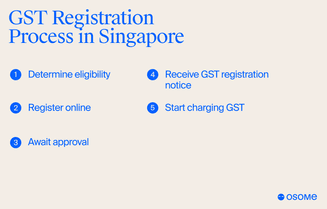GST Registration in Singapore: Requirements and Benefits
- Modified: 16 April 2025
- 9 min read
- Grow Your Business


Gabi Bellairs-Lombard
Author
Gabi's passionate about creating content that inspires. Her work history lies in writing compelling website copy and content, and now specialises in product marketing copy. When writing content, Gabi's priority is ensuring that the words impact the readers. As the voice of Osome's products and features, Gabi makes complex business finance and accounting topics easy to understand for small business owners.
Does your business in Singapore need to register for GST? What are the benefits if you register and pay GST?
Our comprehensive guide tackles the essentials of registering for GST, from meeting the S$1 million taxable turnover threshold to the perks of being a GST-registered entity, ensuring you make informed decisions for your business.
Key Takeaways
- In Singapore, you need to register for GST if your business has a taxable annual turnover exceeding S$1 million, or you can undertake to register for GST voluntarily if your business is under this threshold, subjecting it to a minimum two-year retention period.
- Registering for GST involves determining eligibility, registering online through the official portal, waiting for IRAS approval, receiving a registration notice and then officially charging GST from the effective date.
- Registering for GST offers benefits such as the ability to claim input tax, increased business credibility, compliance with regulations, a competitive edge in the marketplace, and the opportunity to expand globally.
What Is the Goods and Services Tax (GST)?
The Goods and Services Tax (GST) in Singapore is a broad-based consumption tax that applies to almost all goods and services, as well as imported goods. This tax is designed to generate revenue for the government. Every business in Singapore plays a critical role in this taxation process. When they register for GST, they collect GST on behalf of the government and remit it accordingly. Given the significance of this role, it’s vital to grasp the process and understand the concepts of collecting GST, how to pay GST, and GST incurred, as well as the importance of managing GST transactions effectively.
Let's dive right into it.
To simplify this process, Osome offers comprehensive accounting services to ensure your GST registration and management are handled seamlessly, allowing you to focus on growing your business.

Mandatory vs. voluntary GST registration
Registering for GST in Singapore can either be mandatory or voluntary. Businesses are obligated to register for GST if their annual taxable turnover exceeds S$1 million within a year, either retrospectively or prospectively. But what if your business hasn’t hit that mark yet? Well, you’re not left out.
Businesses that generate an annual taxable turnover of less than S$1 million have the option to voluntarily register for GST. This provides them with the opportunity to benefit from registration even if they are below the mandatory threshold. However, it’s important to remember that once you register voluntarily, you’re required to remain registered for at least two years.
Exceptions to compulsory registration
Even with the S$1 million threshold for GST registration, there are exceptions. Depending on your business type, you can apply for exemption from GST registration if you meet specific criteria. One key aspect is to monitor their taxable turnover every quarter to determine the necessity for registration.
Therefore, despite the intimidating S$1 million threshold, options exist for businesses to navigate through Singapore’s GST landscape.
Who Needs To Register for GST?
GST registration in Singapore is required for the following entities:
- Existing GST-registered businesses within the S$1 million taxable turnover threshold
- Overseas entities making taxable supplies in Singapore
- Any joint venture that fulfils specific conditions
In addition, businesses that do not exceed the taxable turnover threshold of S$1 million can voluntarily register for GST, provided they meet certain conditions set by the tax authority.
This broad scope ensures that businesses of all sizes and types have the opportunity to contribute to Singapore’s tax system.
GST Registration Process in Singapore
The GST registration process in Singapore may seem complex at first glance, but it’s quite straightforward once you understand each step. From determining eligibility to starting to charge GST, each stage has clear guidelines and requirements to ensure your business is correctly registered.
Let's examine each step in detail.

Step 1: Determine eligibility
The first step in the process is determining eligibility. Businesses must register for GST if their taxable turnover at the end of a calendar year exceeds S$1 million or if they expect to exceed this amount in the next 12 months. Businesses not liable for compulsory registration may still opt for voluntary registration after considering the implications.
Keep in mind, however, that failing to register for GST on time can result in penalties.
Step 2: Register online
Once eligibility is determined, you need to register online via mytax.iras.gov.sg, the official portal for tax matters in Singapore. During the online application process for overseas vendor registration, businesses must provide the necessary supporting documents and, in some cases, complete an e-learning course.
These e-learning courses are designed to provide comprehensive training on GST regulations, compliance, and administration. These courses are essential for your business to ensure you adhere to the GST requirements in Singapore.
Despite appearing somewhat rigorous, this phase guarantees that any GST-registered business is adequately prepared for its tax obligations.
Step 3: Await approval
After submitting the application for GST registration, the waiting period for the approval letter begins. The Inland Revenue Authority of Singapore (IRAS) reviews the application, which typically takes 10 working days for most applications, while some may take up to 30 days. During the review, the Comptroller may request additional information or documents for your business. So, patience and preparedness are key during this phase.
Step 4: Receive registration notice
Once the application for GST registration is successfully reviewed and approved, a business generally receives a GST registration notice from IRAS confirming the GST registration number and the effective date of GST registration. This official GST registration number must be printed on all invoices, credit notes, and receipts.
It’s important to note that businesses can’t charge or collect GST before the official effective date of GST registration.
Step 5: Start charging GST (output tax) on goods and services
The final step in the registration process is to start charging GST on goods and services from the effective date of registration. In Singapore, output tax refers to the GST that a GST-registered business charges on its taxable supplies of goods and services.
With their official registration number printed on all invoices, credit notes, and receipts, businesses can now legally collect GST output tax from their customers. Remember, charging GST before the official effective date of registration is prohibited.
What Are the Benefits of Getting Registered for GST?
GST registration in Singapore may be a regulatory requirement for many businesses, but it’s not all about compliance. When you are registered for GST, you also enjoy certain tangible benefits that can provide your business with a competitive advantage. Let’s delve into these benefits, from input tax claims to extended global reach.
1 Input tax claim
The input tax claim is one of the most significant benefits of registration. This mechanism allows businesses to:
- Reduce their tax burden by offsetting the GST paid on their purchases with the GST collected on sales on their GST return
- Effectively manage their cash flow
2 Credibility and trust
Being registered for GST can also enhance a business’s credibility and trust. It signals to customers and GST-registered suppliers that the business complies with tax laws and maintains a professional stature. This can translate to better prices and credit terms from suppliers and increased confidence from customers.
3 Compliance with regulations
Compliance with regulations is another important benefit of GST registration. By adhering to GST laws, businesses can avoid legal repercussions and financial penalties. This not only provides a sense of security but also enhances overall business efficiency.
4 Competitive edge
GST registration can also provide a competitive edge. Businesses that are GST-registered can claim input tax credits, which can lower their overall costs compared to non-registered businesses. Additionally, GST registration can provide an advantage when competing for government contracts and tenders, which often require GST registration. GST-registered suppliers would also prefer to do business with you.
5 Global reach
Lastly, GST registration can enable businesses to:
- Expand globally by being compliant with international tax regulations
- Facilitate cross-border trade
- Enhance global market access
- Tap into new markets and grow their customer base
When Do You Need To Be GST Registered?
Deciding the timing for GST registration forms a vital part of business planning in Singapore. Businesses need to register for GST retrospectively if their taxable turnover exceeds S$1 million at the end of a calendar year. It’s also necessary to register prospectively if they expect to exceed this amount in the next 12 months. Remember, your GST registration application needs to be submitted on time, or it could result in fines and penalties.

GST Registration Documents
For GST registration, businesses must submit an online application along with necessary supporting documents to the corporate regulatory authority. These include the business’s ACRA Business Profile or, for overseas businesses, a Certificate of Incorporation in English.
For voluntary GST registration, a GIRO application form and the acknowledgement pages from the ‘Overview of GST’ e-learning course are also required.
How Long Does GST Registration Take?
The GST registration process in Singapore typically takes 10 working days for most applications. However, some cases may take up to 30 days if additional review or documentation is required.
The approval for GIRO applications may take as long as 3 weeks.
Deadlines and Penalties
Navigating the GST landscape in Singapore involves being aware of important deadlines and potential penalties. Businesses are required to register for GST and file their returns within specific timelines. Late registration and non-compliance can lead to penalties, including a 5% late payment penalty and an additional 2% penalty per month for GST payments that are more than 60 days overdue.
Responsibilities of a GST-Registered Business
Being GST-registered comes with a set of responsibilities that businesses must fulfil. These include filing GST returns, paying GST, and maintaining proper records of business transactions and accounting records for at least 5 years.
Let’s examine these responsibilities in more detail.
Filing GST returns through the myTax portal
One key responsibility of GST-registered businesses is filing GST returns. You must submit these electronically via the myTax Portal at mytax.iras.gov.sg. Most businesses are required to file GST returns quarterly, but there is an option to apply for monthly filing.
Remember, even if there are no transactions, a ‘NIL’ return must still be filed.
Payment of GST
Another critical responsibility is the payment of GST. After submitting the GST F5 tax return, businesses are required to pay the tax amount due within one month. This helps to ensure that the tax system runs smoothly and efficiently.
Record-keeping and administrative requirements
Lastly, GST-registered businesses are required to maintain proper records of their business transactions and accounting records for an accounting period of at least 5 years. This includes records of the GST collected from customers and the GST paid to suppliers or on imports.
Proper record-keeping is an essential aspect of managing a GST-registered business, ensuring transparency and accountability.
GST when you import goods
For goods imported to Singapore, importers must declare these at the Singapore Customs when they submit an Import Declaration form. The GST you pay is calculated based on the CIF (cost, insurance and freight) value and any customs duty that may apply.
The GST payment has to be made at the time of importation, and you must pay it before the goods can be released from customs control.
Cancelling Your GST Registration
At times, you may need to cancel your GST registration. This could be due to ceasing operations, transferring the business entirely, or changing the business entity form. Businesses are required to cancel their GST registration within 30 days of such changes by submitting supporting documents.
After de-registration, businesses must not charge GST, issue tax invoices, and are still required to pay GST when importing goods.
Summary
Navigating the GST registration process in Singapore can seem daunting, but with a clear understanding of the requirements, process, and benefits, businesses can confidently fulfil their tax obligations. From determining eligibility, registering online and awaiting approval to receiving a GST registration notice, starting to charge GST, and filing your GST returns - each step is a crucial part of successful GST registration. With the benefits of input tax claims, increased credibility and trust, compliance with regulations, a competitive edge, and global reach, GST registration in Singapore is a significant business milestone.
FAQ
What is the GST?
GST is a consumption tax applied to most goods and services in Singapore, including imported goods.
Who needs to register for GST in Singapore?
Businesses with taxable turnover exceeding S$1 million must register for GST in Singapore, while those with lower turnover can choose to register voluntarily.
How long does the GST registration process take?
The GST registration process usually takes around 10 working days for most applications, but it may extend to 30 days in some cases.
What are the benefits of GST registration?
GST registration offers various benefits, such as claiming input tax, enhancing credibility, and gaining a competitive edge in the market. It also helps in compliance with regulations and facilitates global expansion.
How can I cancel my GST registration?
To cancel your GST registration, you must do so within 30 days of stopping taxable supplies, ceasing operations, transferring the business entirely, or changing the business entity.
Get expert tips and business insights
By clicking, you agree to our Terms & Conditions,Privacy and Data Protection Policy
We’re using cookies! What does it mean?






